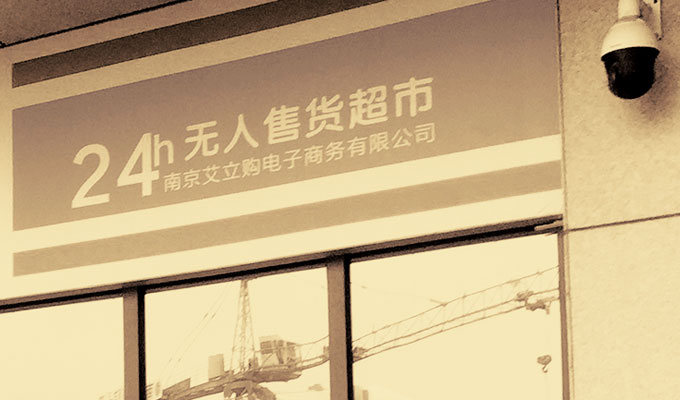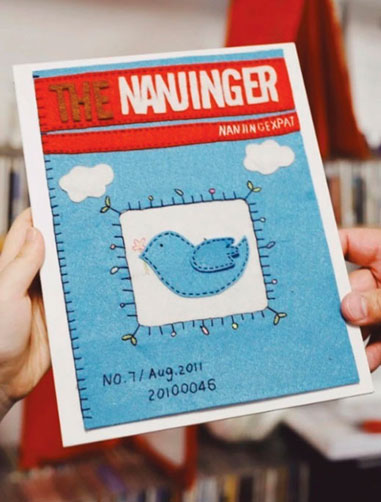Wow, your Chinese is very good”, remarked the supermarket checkout employee. “Your pronunciation is very standard, better than ours”, chimed in her giggling colleague on the adjacent cash register.“How long have you been in China?” “Longer than you”, I say, using my favourite China line for the third time that week.“Where are you from?”
Blah, blah, blah…
Later, upon returning from a mid-morning meeting downtown, we found the little scrap of paper under the car’s driver-side windscreen wiper. On it was scrawled, “I’m the parking guy. Have gone to lunch. Please call me when you come back: My number is….”
Elsewhere, The Nanjinger’s Executive Editor, Renée Gray Beaumont, recalls for us some of her own experience when dealing with Nanjing’s transportation system.
“I used to get the number 34 bus to and from work every day. Most of the drivers were miserable and it was clear they hated their job. But there was one who stood out from the rest. Nearing old age, he would always take the time to give me a smile and a nod of the head. This gesture made my hellish bus experience all the more bearable and I was very grateful for that.”
Over on the iron way, the Nanjing-Beijing sleeper, train number 1462 (it’s not worthy of a letter prefix) departs at 4:45pm and arrives in Beijing, its “pukuai” (普快) designation being somewhat of a misnomer, some 18 hours 1 minute later.
Those 18 hours are also fairly noisy, and clanky, with the train stopping at half the stations between here and Beijing. Yet, it is along this sweaty, dirty ride, that one can be invited into a stranger’s cabin, to sit and chat a while, to even escape to the dining car with the English speaking one and quaff beers late into a rattly night.
These four stories all date from a time that is really not so long ago. A time of considerable inconvenience, some might argue.
They may well be right too, as it is time to bring our story bang up to date, with their modern era equivalents.
For this age of expediency has brought us convenience stores that are unstaffed (pictured). Creations of the online retailers, who view brick and mortar stores as modern evils, here is where it is intended that we shop in the future.
Convenient; yes, when the technology works. Disconcerting; definitely.
While such stores remain few and far between, at least for the moment, on a grander scale, Nanjing-based retailer and convenience store operator Suguo has also recently introduced self-service checkouts at many of its larger branches. Enter your phone number associated with your Suguo VIP account, scan your items, select payment by WeChat, Alipay or what have you, open the APP and let your phone be scanned. Done.
Elsewhere, the parking guy has become all-but extinct. In this super age of the Mall, parking, for the most part, is now a subterranean affair.
Until recently, underground parking facilities featured a person in a booth at the entrance, one whose sole job was to present a card to an entering car, and extract cash from it upon exit.
That person is now unemployed.
They’ve been replaced, by a QR code.
Now, number plate recognition technology takes note of the car upon entry. Prior to exiting, the driver scans a QR code, usually semi-conveniently located, enters their car number plate number and makes an online payment. Done.
As more and more Metro lines open, so it has become the de facto form of public transportation. For nothing moves large numbers of people around than underground tunnels through which trains zoom every 3 minutes. In 2017, there were close to 1 billion passenger journeys made on the Nanjing metro system.
There, standing shoulder to shoulder, Nanjing Metro TV tries desperately in vain to distract passengers from their cellphones.
On the Metro’s high-speed cousins, the 18-hour marathon to Beijing is now a 3-hour commute. But just as with the Metro, distractions are few and far between. Noteworthy, though, are perhaps the man speaking way too loudly and obnoxiously on his phone, together with the disembodied announcement informing passengers that failing to comply with the Railway Bureau’s regulations may affect their credit rating.
It’s all very, very convenient. To a degree that is almost dystopian.
The Oxford English Dictionary describes a dystopia as, “An imagined state or society in which there is great suffering or injustice, typically one that is totalitarian or post-apocalyptic”.
You have now arrived at your destination.
It is also a convenience that begs bigger questions to be asked. Is this a two-way street? Have we deliberately created all this convenience as a means to avoid inter-personal communication? If so, when Artificial Intelligence does take over the world, will we only be able to sigh and say that we brought it on ourselves?
Back on the buses, Renée concludes her story.
“When Christmas came around, I wrote him a card and gave it to him one day. In return, he waited until he saw me next and handed me a box of chocolates with a small note that read ‘Merry Christmas’. I still don’t know his name to this day but I will never forget his face and our lovely, human interaction.”
Facing the reality of today, the coin has two sides. For the foreigners who don’t speak Chinese, this lack of inter-personal communication is a bonus. Simply sit down in the restaurant and point at the menu. When finished eating, sign the imaginary check in the air, then hold out one’s phone to be scanned.
That’s convenience for you. And China is all the worse for it.











